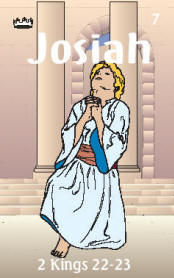|
Josiah Trading Card |
Judah’s Last Day’s
While the good King Josiah was trying to get rid of idols and restore the true worship, God was using the prophet Jeremiah to try to change the people's hearts. Jeremiah has been called "the weeping prophet" because he had to watch his nation perish. The years after Josiah's death showed Jeremiah was fighting a losing battle. Time and again he begged them to change their evil ways. But Judah's last kings were wicked men. They wanted to enjoy their riches instead of listening to the gloomy words of Jeremiah! When he earnestly pleaded, "Stand in the ways and see, and ask for the old paths, where the good way is, and walk in it; then you will find rest for your souls," they refused to listen. "We will not walk in it!" they arrogantly replied. It was much easier to listen to the false prophets who promised better times were ahead!
You remember Isaiah had said the cruel Assyrians would be destroyed and God would bring the Babylonians against His own people. Eventually the Babylonian king Nebuchadnezzar took over the Assyrians' territory and made the Southern Kingdom of Judah pay tribute. Jeremiah urged Judah's last kings to give Nebuchadnezzar whatever he wanted--then he would leave them in their homeland in peace. However, the kings would not listen. Still Jeremiah didn't give up. God's words were like a fire burning inside him: "Behold, my anger and my fury will be poured out on this place--on man and beast, on the trees of the field, on the fruit of the land and it will burn and not be quenched." God had been longsuffering for hundreds of years, but his patience was almost gone.
God's warnings began to be fulfilled in the days of King Jehoikim, son of the good King Josiah. The Lord brought Nebuchadnezzar against Jerusalem and he carried off its brightest young men, along with some of the gold dishes from the temple. Daniel, Shadrach, Meshach and Abednego were among the captives taken back to Babylon.
All of this did not seem to bother Jehoikim. Maybe he thought, "Well, Nebuchadnezzar was not so bad after all. That crazy Jeremiah is just an alarmist!" But Jeremiah told Jehoikim his troubles were not over. Unless they did as Nebuchadnezzar said, he would bring his armies back to destroy them.
At the same time false prophets were telling the king not to worry, saying, "Peace, Peace" when there was no peace. "Neither will evil come on us nor shall we see sword or famine," they claimed. Of course they were just saying what everyone wanted to hear. Jeremiah, however, was astonished at 'their bold lies. "A horrible thing has been committed in the land," he declared. "The prophets prophesy falsely and the priests rule by their power--and my people love to have it so!"
The false prophets thought nothing could happen to them as long as God's Spirit dwelled above the Mercy Seat in the temple. So God sent Jeremiah* to stand near the temple and say, "Do not trust in lying words, The temple of the Lord, the temple of the Lord' are these." Hadn't God destroyed Shiloh, where the tabernacle stood during the days of Samuel?
Why did they think Jerusalem would be any different The priests and prophets were furious at Jeremiah's words and seized him on the spot, shouting, "You shall be killed!" Then they tried to stir up the princes and all the people, saying, "This man deserves to die! For he has prophesied against the city, as you have heard with your ears."
But the princes and the people disagreed, saying, "This man does not deserve to die. For he has spoken to us in the name of the Lord our God." Some of the elders reminded them that the prophet Micah had said almost the same thing during the days of Hezekiah that Jerusalem would become heaps because of her sins.
"Did Hezekiah put him to death? Did he not fear the Lord and seek His favor?" they asked. And for the time being, Jeremiah was allowed to go free.
